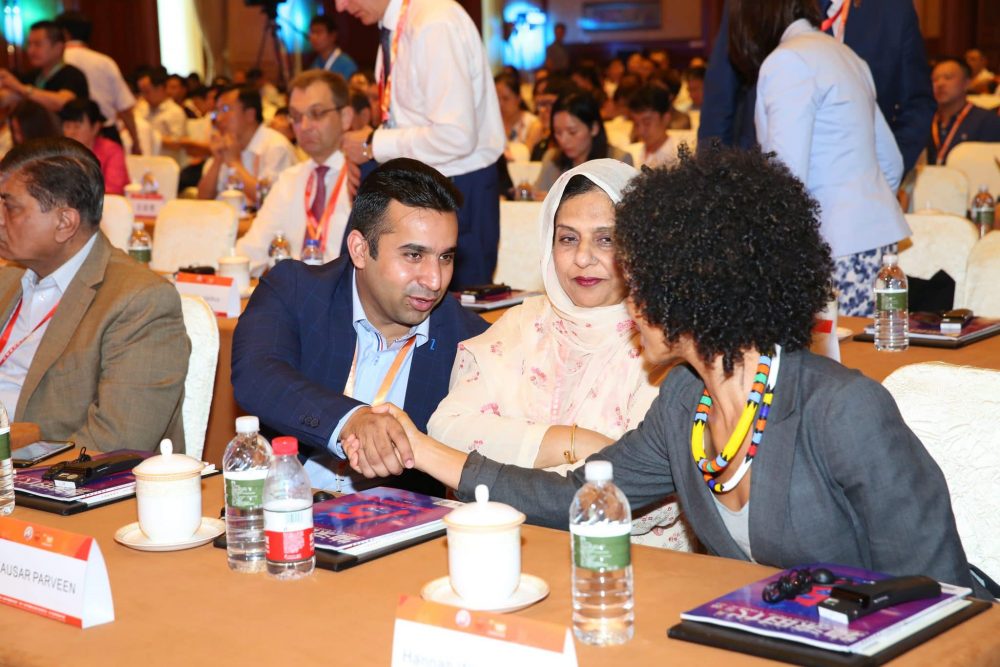China’s engagement with the African continent has gained much attention in recent years, as infrastructural and building projects carried out by Chinese firms are changing the face of cities across the continent. China is currently the largest bilateral trading partner for Africa as a whole (although the EU is even larger if taken as one). Increasing numbers of Chinese citizens are moving to African countries for work and business. Eye-catching projects like the Nairobi-Mombasa railway in Kenya, funded mainly through Chinese loans and contracted to Chinese companies, have convinced many that the relationship with China carries the potential to transform Africa.
The impact of this relationship on African countries remains an issue of contentious debate, both within Africa and internationally. It was the crucial need for people in the international development community to understand how China really works that led Hannah Ryder to move to China and start Development Reimagined.
Originally from Kenya, but raised in the UK, Hannah held a series of distinguished positions within the British civil service, working on climate change and assistance to developing countries, before moving to Beijing in 2014. What motivated her to move to China, she says, were her frequent trips back to Kenya, where she was born and lived until she was 10, and to other countries due to her work on climate change. What she saw was that all these countries were changing fast, and the one major player involved was China.
As Hannah tells me, sitting in her office in the middle of Beijing’s business district, “I would speak to ordinary citizens and to government officials, and there was not a major difference between what the two groups knew in terms of how to interact and work with China. Where I was working in DFID (the UK’s Department for International Development) there were very few country offices that had really reached out to their Chinese counterparts to understand what was happening, and yet China was having this huge impact on development. I thought, ‘that can’t be right’, and so I felt the need to actually go to China and understand.”
Hannah was especially interested in understanding how decision-making processes work for Chinese stakeholders. She initially found a position with UNDP, which allowed her to gain much insight into how things are structured within Chinese officialdom. After working there for a couple of years, Hannah founded her own consultancy, Development Reimagined, which focuses on China-Africa cooperation. It is the first Kenyan WOFE (Wholly Foreign-Owned Enterprise) in China. She says she was motivated partly by the realization that there was a real demand from African governments for help to improve their relationship with China, a demand that nobody was fulfilling. She also enjoys the flexibility and creativity that come with running your own consultancy. Development Reimagined currently works on a number of projects, supporting African entrepreneurs who want to enter the Chinese market, providing consultancies to African governments and stakeholders, and producing reports and studies on various aspects of the Africa-China relationship.

Hannah has some pretty important points to make about the current state of relations between Africa and China. First of all, she says, China is currently Africa’s largest bilateral trading partner. However, for most African countries this relationship is mostly about importing from China, not exporting to China. This has helped people consume more, but not really expanded the local economies. Contrary to popular belief, Hannah explains that there actually isn’t very much direct Chinese investment in Africa. What is very common, however, is African governments taking loans from China, and then contracting Chinese organizations to deliver the projects. As she puts it, “that is not a Chinese investment, it’s an African investment”. African countries tend to take loans from China because they are cheaper and more readily available.
At the same time, Hannah is dismissive of fears of African countries falling into a “debt trap”. As she argues, “energy access in Africa is well below other regions. The majority of poor people in the world are in Africa now. In so many ways, Africa is lagging behind, and it has a fast rising population. The African continent needs to make far more investment in infrastructure.” She adds that “the issue is not about a debt trap, because African countries need way more loans and debt than they have right now. They won’t reach the SDGs if they don’t take out more debt. Nothing except debt will provide it. They can’t provide it through their own taxes”.
Hannah explains that in the past African countries were forced to rely on the World Bank, which was problematic because it meant they could be pushed to move their policies in certain directions. The presence of China now gives them more options, but the problem is whether the loans are really being used in a productive fashion, and whether African governments are negotiating well and maintaining the infrastructure. “The international community should be thinking about these questions, rather than about whether there is a debt trap or not”.
Hannah also points out that China has actually engaged in debt relief to the same degree as all the other bilateral partners involved in the HIPC (Heavily indebted poor countries) initiative, cancelling debt just as much as the countries of the “Paris Club” of donors, which includes all the major Western countries. There is little evidence, she says, to support the fears of asset grabbing in exchange for debt relief. What she does recommend in her advisory role is for African finance ministers to come together and discuss the loans they are getting from China, so they can learn to negotiate better and get the best loans possible.
When asked about the impact of the Belt and Road Initiative, Hannah says that the BRI did not seem to have much impact initially, but things may change soon, since after the China-Africa Forum in 2018, 44 African countries signed MOUs with China regarding the BRI. She stresses, however, that for many Chinese stakeholders there is an urgent need to gain a better understanding of Africa, and understand what projects are possible on the ground. “People here, whether it’s private citizens or enterprises, don’t really know much about African countries.”
Development Reimagined is doing its best to change that, partly through initiatives that bring Chinese consumers into contact with African products and companies. They focus particularly on African businesses that have a sustainable development mission, and also on businesses that make high-end or luxury products, which in themselves can challenge perceptions of Africa. Last year, the consultancy brought CEOs from seven African companies to China for a ten-day program, and gave them a bit of background in terms of business registration, trademarking, intellectual property, and the importance of connections in the country. Then they brought them to the first China-Africa Expo, held in Changsha, to give them a taste of the Chinese consumer market, and to the World Economic Forum in Dalian, to introduce them to potential Chinese investors and partners.
As Hannah puts it, “I think for them it was really enlightening. In order to find those seven CEOs we spoke to about 50 African brands. Many of them didn’t know anything about the Chinese market, didn’t think their products could be relevant or successful here, and had many concerns. They were worried about their IP being stolen, or that they couldn’t deliver the capacity required, but then coming here they realized that it’s totally different from what they imagined, and they are now really excited about the whole proposition. So we are still supporting those companies, and we are really excited to take the next steps, like the trademark registration, and think about the logistics of how they can get their products into China.”
Development Reimagined is currently talking to the Chinese E-commerce platforms to know if they could offer a special platform for these African entrepreneurs, which would also help avoid import licences. They are also working with airlines that can help to get the products to China.

Development Reimagined is also in the process of completing a report on China’s official ODA (overseas development assistance) system, looking at it from the perspective of the recipient countries. According to the findings, 27 countries have been collecting data on Chinese aid, and there is more and more interest from the recipient countries in trying to understand the structure of Chinese aid. The issue, she explains, is that statistics on Chinese aid remain remarkably opaque: figures broken down by country or sector are simply not published. The recent creation of a new agency for international development hasn’t really changed this situation. “We hope that more countries work to find more information from the bottom-up, or even just ask for more information. If they ask, the Chinese authorities will provide it. That’s what we do know.”
When asked about the role that Chinese NGOs and civil society organizations could potentially play in Africa, Hannah says: “I think it’s great if Chinese NGOs can move more and more into Africa, because that is where the needs are greatest, like I said it’s the region with the most people in poverty. If Chinese NGOs are going out, that should definitely be the priority.” Hannah has been personally helping to raise funds for the China Foundation for Poverty Alleviation’s hospital in Sudan.
However, she says that there is a need to reflect seriously on where Chinese NGOs can best add value. Just repeating what NGOs from Western countries do may not be the best way. She adds that Development Reimagined has just written a report for China’s Ministry of the Ecology and the Environment, based upon a survey of 22 officials and experts from BRI countries who came to China for training. The surveyed officials felt that where China could add the most value, compared to other partners, would be in areas like the provision of green infrastructure, equipment, or the delivery of certain standards potentially more applicable to developing countries.
Hannah adds that the role of NGOs in most African countries is seen as an advocacy role, and even though it is hard for Chinese NGOs to take on that role, they should at least be aware of this situation and integrate into the system. “I think the other aspect is the importance of trying to integrate with the local communities, and doing that in a very active and intentional way. If they simply deliver a project without real needs analysis, it’s easy to deliver something that not really of use. If it’s a hospital, how do you make sure that there will really be doctors? If you provide the doctors at certain times of the year, what happens at other times? If you provide equipment, how is it going to be maintained? These are the big questions. You need to really think through the sustainability of it. Some of that isn’t always intuitive with Chinese NGOs.”



